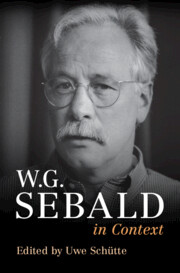Book contents
- W.G. Sebald in Context
- W.G. Sebald in Context
- Copyright page
- Dedication
- Contents
- Illustrations
- Notes on Contributors
- Preface
- Acknowledgements
- Note on Text
- Chronology
- Abbreviations
- Works by W.G. Sebald
- Part I Biographical Aspects
- Part II The Literary Works
- Chapter 8 Unpublished Juvenilia
- Chapter 9 Film Scripts
- Chapter 10 The Prose Project
- Chapter 11 Auto-/Biography
- Chapter 12 Natural History and the Anthropocene
- Chapter 13 The Corsica Project
- Chapter 14 Poetry
- Chapter 15 The World War Project
- Chapter 16 Interviews
- Part III Themes and Influences
- Part IV Reception and Legacy
- Further Reading
- Index
Chapter 13 - The Corsica Project
from Part II - The Literary Works
Published online by Cambridge University Press: 24 August 2023
- W.G. Sebald in Context
- W.G. Sebald in Context
- Copyright page
- Dedication
- Contents
- Illustrations
- Notes on Contributors
- Preface
- Acknowledgements
- Note on Text
- Chronology
- Abbreviations
- Works by W.G. Sebald
- Part I Biographical Aspects
- Part II The Literary Works
- Chapter 8 Unpublished Juvenilia
- Chapter 9 Film Scripts
- Chapter 10 The Prose Project
- Chapter 11 Auto-/Biography
- Chapter 12 Natural History and the Anthropocene
- Chapter 13 The Corsica Project
- Chapter 14 Poetry
- Chapter 15 The World War Project
- Chapter 16 Interviews
- Part III Themes and Influences
- Part IV Reception and Legacy
- Further Reading
- Index
Summary
This essay examines the period between the publication of The Rings of Saturn (1995) and Austerlitz (2001). During this six-year time span, the concept of the ‘natural history of destruction’, Sebald’s negative philosophy of history, gains more and more prominence in his writings. This especially applies to the unfinished Corsica Project and in his Zurich Lectures on air war and German literature (resulting in: On the Natural History of Destruction). The Corsica Project examines various forms of human aggression: hunting, blood revenge, deforestation, and pyromania. The origin of these forms of aggression against nature are attributed to nature itself, thus forming part of an all-encompassing natural history of destruction. The destructive instinct of human beings is presented as an innate, natural characteristic and thus as beyond personal moral responsibility. In On the Natural History of Destruction, this pessimistic idea is applied to contemporary history, with the phenomenon of firestorms in the bombing raids of World War II becoming emblems of the natural history of destruction.
- Type
- Chapter
- Information
- W. G. Sebald in Context , pp. 110 - 118Publisher: Cambridge University PressPrint publication year: 2023

